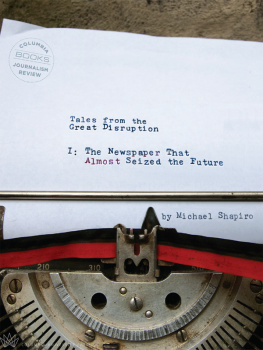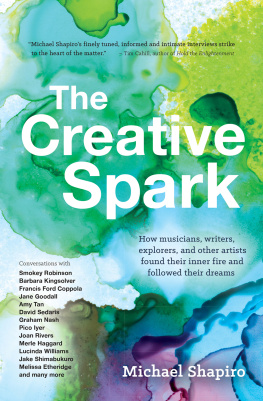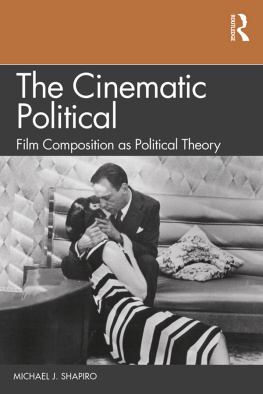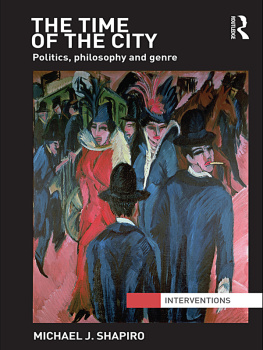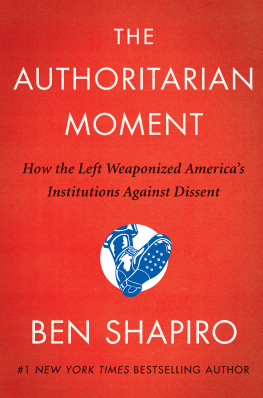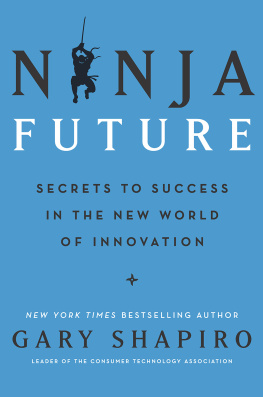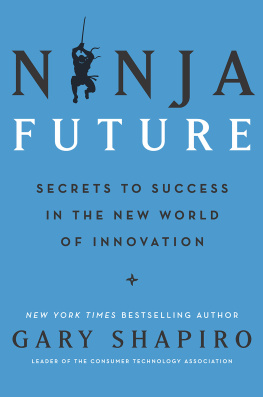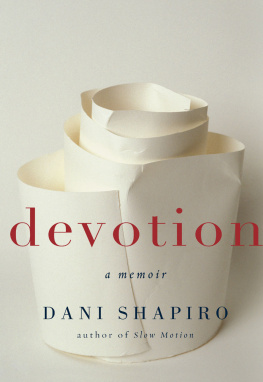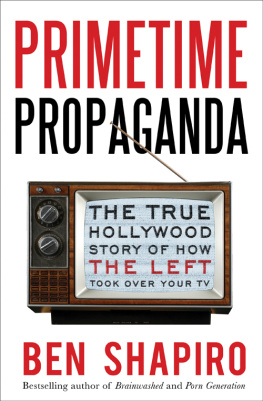Columbia University Press
Publishers Since 1893
New York Chichester, West Sussex
cup.columbia.edu
Copyright 2011 the Columbia Journalism Review
All rights reserved
E-ISBN 978-0-231-52739-2
Cover design: Michael Keller
Library of Congress Cataloging-in-Publication Data
A complete CIP record is available from the Library of Congress
Columbia Journalism Review Books
A Columbia University Press E-book.
CUP would be pleased to hear about your reading experience with this e-book at .
The Newspaper That Almost Seized the Future
The San Jose Mercury News, Silicon Valleys own daily, was poised to ride the digital whirlwind. What happened?
BY MICHAEL SHAPIRO
1. It Was Written
Randall Keith and I are talking about the past when his boss, Dave Butler, slides open a glass door, eases his long frame into a chair, plants his feet on the conference room table, and makes clear by his weary affect that the topic does not interest him. Instead, this is what Butler wants to talk about when he talks about his newspaper, the San Jose Mercury News: all the many readers2.7 million weekly, in print and online when you factor in the
Mercs smaller sister papers across the Bay Area; the Mercs new spiffy app; its willingness to focus on the important stuff rather than compete with every school board that has a website and all the many tech bloggersI have no idea how many blogs are dedicated to covering Applebecause, he says, the Merc is willing to be more interesting. He wants to talk about making money, too, because the Merc makes some. How much he will not say, except that most of the profits still come from print.
Dave Butler has been a newspaperman since 1972, a self-described journeyman who became the editor of the Mercury News in 2008. The paper had been sold two years earlier by its longtime parent company, Knight Ridder, to the McClatchy Company. McClatchy in turn quickly sold it to MediaNews Group, whose chairman, Dean Singleton, put Butler in charge. Three months into the job, Butler wrote a memo to the staff, outlining a vision that could essentially be boiled down to a simple premise: the past could no longer animate the Mercury News. The days of four hundred people in the newsroom, revenues of $300 million and profit margins north of 30 percent, a bureau in Hanoi, a Pulitzer for foreign news, Spanish and Vietnamese language editions, and a Sunday magazine, were gone. The staff of the Merc, now about half the size it was at its peak in the late 1990s, had no choice but to press on with vigor and a sense of mission: Lets carve some new trails in the jungle of journalism!
Butler has the advantage of having missed his papers past, and so is unencumbered by the memory of what the place had been, not so long ago. Randall Keith knew. He had arrived earlier, in 1998, just in time to watch the great tech bubble inflate, carrying the Merc along with it. He had left a job as city editor of the Quincy, Massachusetts, Patriot Ledger to join a paper with a national reputation both for its journalism and its profitability. Time magazine had several years earlier dubbed the Merc the nations most tech-savvy newspaper. Its revenues from classified advertisingespecially recruitment ads for all those many high-tech companies whose every product rollout and inevitable IPO were covered by the papers burgeoning business staffhad fueled ever more revenue, $288 million the year Keith arrived.
The Merc was fat, ambitious, and admired in those days, in particular for the speed with which it had adapted to the great technological changes that were shaking the industry. It seemed destined, in fact, to master those disruptions, fitting for a paper whose widely read day- opening blog was called Good Morning Silicon Valley.
The Merc was among the first daily newspapers in the country with an online presence, the first daily to put its entire content on that site, the first to use the site to break news, and among the first to migrate that burgeoning online content to the web. In the early 1990s, the joke among the papers small online staff was that, given the still modest returns on its digital investment, the paper could still make a few bucks charging admission to all the visitors from papers across the country (and around the world) who showed up to see how they were doing it.
It was a big adventure, Keith says. It was a lot of fun.

A glimpse Before he ran the Mercury News, Robert Ingle worked for The Miami Herald, where he witnessed Viewtron, Knight Ridders early experiment in electronic publishing. He used it between rounds of a televised boxing match to check the judges scores, and was impressed.
THE MERC IS HEADQUARTERED IN A WHITE WEDDING CAKE of a building that sits off a highway, and across from a largely deserted mall. There is a red linotype machine in the lobby, and late on a rainy afternoon it seems to be the only splash of animation in a building where voices feel not so much hushed as absent. The conference room looks out onto a dim and quiet newsroom. Many of the people with whom Keith once worked are gone. After one of several rounds of newsroom layoffs, a photographer went through the building taking pictures not of peoplethe people had leftbut of rows of empty cubicles, stacked computer terminals, blank bulletin boards, and vacant corridors.
Keith is managing editor of digital content for the Merc and for the Bay Area Newspaper Group, of which it is a part. He wants to make clear that while the past was a glorious time, he, like Butler, is thinking of the future because, as he puts it, there is always another story to cover.
Would you like to have more? Butler asks. Yes. But you play the cards you got. You can either be a wimp, and bitch and moan. Or you can go after the story.
For years, I had heard from friends whod worked at the Merc what a terrific place it was, how the paper, which until the late 1970s had been profoundly mediocre, as one longtime editor put it, had twenty years later become so rich and successful that it was setting its sights on becoming nothing less than the best in the West. The Merc was one of the jewels of the most respected chain in the businessKnight Ridder, then the owner of thirty-one papers, including Pulitzer machines like The Miami Herald and The Philadelphia Inquirer and the Merc, which had won one in 1986 for its coverage of Ferdinand Marcoss hidden wealth, and again in 1990 for its coverage of the San Francisco earthquake.
Then, things began slipping.
And when the end came in 2006, when Knight Ridder, under the most extreme pressure from its institutional investors, surrendered and sold itself, the people who had seen the Mercury News not as a stepping stone but as a destination, began trying to sort out who, exactly, was responsible.
They are hardly alone. There is no shortage of reporters of a certain age for whom the past is darkened by memories of the slow erosion of the places where they labored and the work that they did. The story of the Mercs rise and declinethere is nothing so telling as only four pages of midweek classifiedsmirrors the story of what has occurred at so many once big and proud newspapers across the country that are still trying to make sense of what happened to them over the past decade and what lessons might be drawn from all the cataclysmic change.
But the fall of the San Jose Mercury News was different, because the Merc, Silicon Valleys paper, had advantages enjoyed by few other dailiesin where it was based, in the affluence of its readers, in its ownership of one of the great transformative stories of the age. The
Next page
